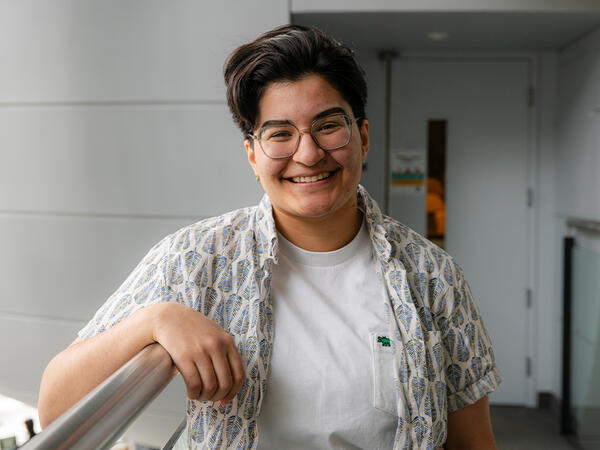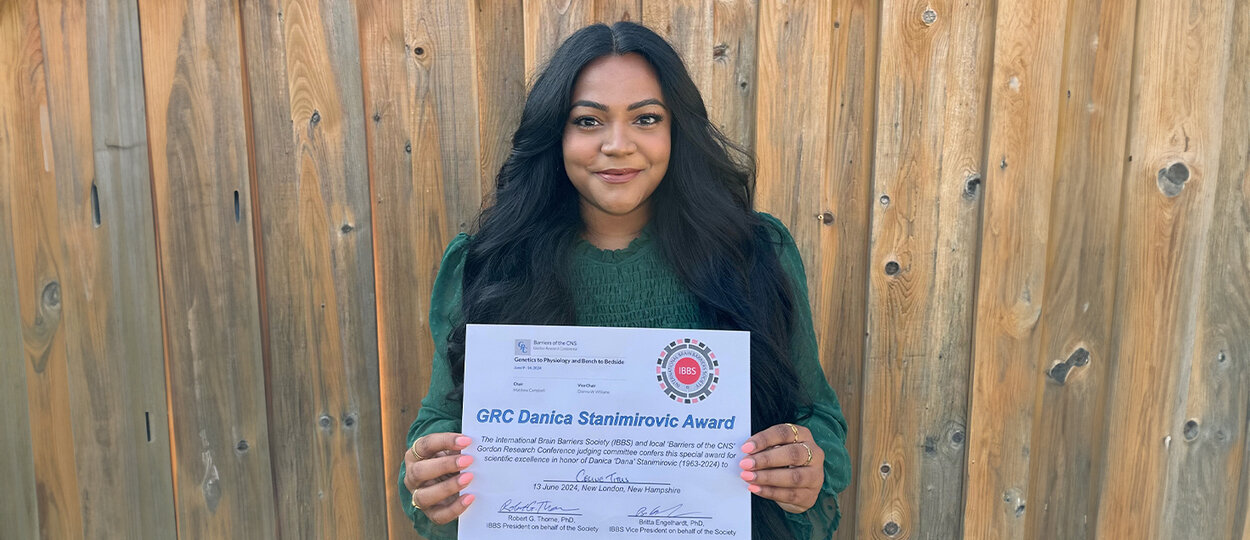Celene Titus, a PhD student in the Bendayan Lab, delivered both an oral and a poster presentation on her abstract, Investigating the Therapeutic Potential of PPAR𝛾 agonist, INT131, in HIV-Associated Neurocognitive Disorders, at the Gordon Research Conference on Barriers of the CNS in Colby Sawyer, New Hampshire. Her exceptional presentation skills led to her receiving the prestigious IBBS award from the International Brain Barrier Society, the highest recognition offered by the society.
What is your academic background and why is your current area of research important?
I completed my Bachelor of Health Sciences from McMaster University in 2021. Following this, I joined Dr. Reina Bendayan’s lab as a direct-entry PhD student. Currently, I am a PhD candidate working in the field of HIV-Associated Neurocognitive Impairments (NCI) and brain inflammation. This area of research is important because it addresses the significant and often overlooked neurological complications experienced by people living with HIV. By investigating novel treatments for this condition, such as Peroxisome Proliferator-Activated Receptor gamma (PPARγ) agonists, I aim to contribute to improving the quality of life for individuals affected by HIV-Associated NCI and advancing our understanding of inflammatory processes in the context of HIV infection of the brain.
What led you to your current Supervisor’s research group?
My research focuses on investigating the anti-inflammatory effects of PPARγ agonists, specifically INT131, as a targeted approach to the treatment of HIV-Associated NCI. This interest stemmed from the increasing prevalence of neurological disorders among people living with HIV. I was attracted to Dr. Bendayan's lab because of their ground-breaking work in addressing HIV-1 associated inflammatory responses. At U of T, our lab is dedicated to studying membrane transport proteins that hinder antiretroviral drug penetration, especially at blood-tissue barriers in neuro-inflammatory HIV contexts. We also investigate the mechanisms underlying brain inflammation, neuronal damage, and the development of HIV-Associated NCI. Our experiments with rodent models have elucidated the role of PPARγ in mitigating brain inflammation. Dr. Bendayan’s lab is committed to advancing HIV research in understanding HIV pathogenesis and developing new treatments.
What are some of the challenges you had to overcome while pursuing your research?
Throughout my research, I have faced several challenges that have significantly contributed to my growth as a scientist. One major challenge was mastering the complex mechanisms and pathways involved in the neuropathogenesis of HIV-Associated NCI, brain inflammation, and neuronal damage. To overcome this, I created detailed mind maps to visually organize and understand these intricate processes. Succeeding in my PhD qualifying exam was another significant milestone, requiring a deep understanding of my field and the ability to articulate my research objectives and findings clearly. Additionally, developing my presentation skills was crucial, as effectively communicating my research to diverse audiences is essential. These experiences have not only enhanced my scientific knowledge but also strengthened my ability to convey complex information effectively.
How do you see your current research playing a role in your career?
My current research provides a robust foundation for a career in the pharmaceutical industry. My extensive research background allows me to contribute significantly to medical communication, strategy development, and scientific support for novel therapeutics. Presenting my work at conferences has enhanced my ability to engage with key scientific leaders, healthcare professionals, and regulatory bodies, ensuring the accurate and effective communication of medical information. Additionally, as a PhD candidate, I possess the skills to analyze pre-clinical data, assess treatment outcomes, and contribute to evidence-based decision-making within medical affairs teams. Overall, my research experience equips me with the expertise necessary for a successful career in medical affairs in the pharmaceutical industry.
What do you like to do when you are not working on research?
I serve as the co-president of the Life Sciences Career Development Syndicate (LSCDS) at U of T, a student-led initiative dedicated to fostering connections between academia and industry. Our primary goal at LSCDS is to assist graduate students and postdoctoral fellows in the life sciences field by providing resources to explore diverse career paths and develop the essential skills required for transitioning into industry roles. We achieve this through a comprehensive range of activities such as career seminars, skill-enhancing workshops, networking events, mentorship opportunities, and engaging case study programs. Aside from these duties, I love to play badminton and enjoy backcountry hiking.
More News
Image

Faces of PharmSci: Mahya Rezaeifarimani
Supervised by Prof. Shirley Wu, PhD student Mahya Rezaeifarimani is developing smart nanoparticles to help make radiation therapy work better for brain tumours by targeting low-oxygen areas that often make treatment less effective.
Read More
Image

Dean Lisa Dolovich reappointed for second term
Professor Lisa Dolovich has been reappointed for a second term as Dean of the Leslie Dan Faculty of Pharmacy, University of Toronto, effective July 1, 2025, to December 30, 2030.
Read More
Image

Pharmacy Summer Camp gives high school students insight into pharmacy profession
A new summer camp based at the faculty will give high school students a range of experiences in pharmacy and pharmaceutical sciences.
Read More
